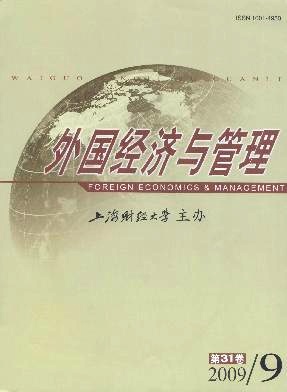产业集群创新能力的概念、要素与构建研究
外国经济与管理 2009 年 第 31 卷第 09 期, 页码:9 - 17
摘要
参考文献
摘要
本文在系统梳理相关文献和交叉借鉴相关理论的基础上,对产业集群创新能力的概念进行了界定,详细分析了其内涵特征;然后归纳、筛选和提炼了集群创新能力的主要构成要素,采用关联开放性和关联协作性两个维度对这些要素进行了结构化分类,并构建了一个集群创新能力的系统研究框架;最后还探讨了构建和更新集群创新能力的实践思路和重点。
[1]Malmberg,A,and Power,D.(How)Do(firms in)clusters create knowledge?[J].Industry&Innovation,2005,12(4):409-431.
[2]Nooteboom,B.Innovation,learning and cluster dynamics[EB/OL].ERIM Report Series No.ERS-2004-006-ORG,2004.
[3]Asheim,B T.Industrial districts as“learning regions”:A condition for prosperity[J].European Planning Studies,1996,4(4):379-400.
[4]Camagni,R.On the concept of territorial competitiveness:Sound or misleading?[J].Urban Studies,2002,39(13):2 395-2 411.
[5]Lawson,C.Towards a competence theory of the region[J].Cambridge Journal of Economics,1999,23(2):151-166.
[6]Lawson,C,and Lorenz,E.Collective learning,tacit knowledge and regional innovative capacity[J].Regional Studies,1999,33(4):305-317.
[7]Keeble,D,and Wilkinson,F.Collective learning and knowledge development in the evolution of regional clusters of high technologySMEs in Europe[J].Regional Studies,1999,33(4):295-303.
[8]Heidenreich,M.The renewal of regional capabilities experimental regionalism in Germany[J].Research Policy,2005,34(5):739-757.
[9]Tura,T,and Harmaakorpi,V.Social capital in building regional innovative capability[J].Regional Studies,2005,39(8):1 111-1 125.
[10]Hervas-Oliver,J L.Do clusters capabilities matter?An empirical application of the resource-based view in clusters[J].Entrepre-neurship&Regional Development,2007,19(2):113-136.
[11]Bathelt,H,Malmberg,A,and Maskell,P.Clusters and knowledge:Local buzz,global pipelines and the process of knowledge cre-ation[J].Progress in Human Geography,2004,28(1):31-56.
[12]Visser,E J,and Boschma,R.Learning in districts:Novelty and lock-in in a regional context[J].European Planning Studies,2004,12(6):793-808.
[13]Lorenz,E H.Trust,community and cooperation:Towards a theory of industrial districts[A].in M Storper,and A Scott(Eds.).Pathways to industrialization and regional development[C].London:Routledge,1992:195-204.
[14]Brusco,S,and Sabel,C.Artisan production and economic growth[A].in F Wilkinson(Ed.).Dynamics of labour market segmenta-tion[C].London:Academic Press,1981:99-114.
[15]Sabel,C,and Zeitlin,J.Historical alternatives to mass production:Politics,markets and technology in nineteenth-century industri-alization[J].Past and Present,1985,108(2):133-176.
[16]Camagni,R.Local milieu,uncertainty and innovation networks:Towards a new dynamic theory of economic space[A].in R Ca-magni(Ed.).Innovation networks:Spatial perspectives[C].London:Belhaven Press,1991:121-142.
[17]Capello,R,and Faggian,A.Collective learning and relational capital in local innovation processes[J].Regional Studies,2005,39(1):75-87.
[18]Keeble,D,Lawson,C,Moore,B,and Wilkinson,F.Collective learning processes,networking and“institutional thickness”in theCambridge region[J].Regional Studies,1999,33(4):319-332.
[2]Nooteboom,B.Innovation,learning and cluster dynamics[EB/OL].ERIM Report Series No.ERS-2004-006-ORG,2004.
[3]Asheim,B T.Industrial districts as“learning regions”:A condition for prosperity[J].European Planning Studies,1996,4(4):379-400.
[4]Camagni,R.On the concept of territorial competitiveness:Sound or misleading?[J].Urban Studies,2002,39(13):2 395-2 411.
[5]Lawson,C.Towards a competence theory of the region[J].Cambridge Journal of Economics,1999,23(2):151-166.
[6]Lawson,C,and Lorenz,E.Collective learning,tacit knowledge and regional innovative capacity[J].Regional Studies,1999,33(4):305-317.
[7]Keeble,D,and Wilkinson,F.Collective learning and knowledge development in the evolution of regional clusters of high technologySMEs in Europe[J].Regional Studies,1999,33(4):295-303.
[8]Heidenreich,M.The renewal of regional capabilities experimental regionalism in Germany[J].Research Policy,2005,34(5):739-757.
[9]Tura,T,and Harmaakorpi,V.Social capital in building regional innovative capability[J].Regional Studies,2005,39(8):1 111-1 125.
[10]Hervas-Oliver,J L.Do clusters capabilities matter?An empirical application of the resource-based view in clusters[J].Entrepre-neurship&Regional Development,2007,19(2):113-136.
[11]Bathelt,H,Malmberg,A,and Maskell,P.Clusters and knowledge:Local buzz,global pipelines and the process of knowledge cre-ation[J].Progress in Human Geography,2004,28(1):31-56.
[12]Visser,E J,and Boschma,R.Learning in districts:Novelty and lock-in in a regional context[J].European Planning Studies,2004,12(6):793-808.
[13]Lorenz,E H.Trust,community and cooperation:Towards a theory of industrial districts[A].in M Storper,and A Scott(Eds.).Pathways to industrialization and regional development[C].London:Routledge,1992:195-204.
[14]Brusco,S,and Sabel,C.Artisan production and economic growth[A].in F Wilkinson(Ed.).Dynamics of labour market segmenta-tion[C].London:Academic Press,1981:99-114.
[15]Sabel,C,and Zeitlin,J.Historical alternatives to mass production:Politics,markets and technology in nineteenth-century industri-alization[J].Past and Present,1985,108(2):133-176.
[16]Camagni,R.Local milieu,uncertainty and innovation networks:Towards a new dynamic theory of economic space[A].in R Ca-magni(Ed.).Innovation networks:Spatial perspectives[C].London:Belhaven Press,1991:121-142.
[17]Capello,R,and Faggian,A.Collective learning and relational capital in local innovation processes[J].Regional Studies,2005,39(1):75-87.
[18]Keeble,D,Lawson,C,Moore,B,and Wilkinson,F.Collective learning processes,networking and“institutional thickness”in theCambridge region[J].Regional Studies,1999,33(4):319-332.
引用本文
周泯非, 魏江. 产业集群创新能力的概念、要素与构建研究[J]. 外国经济与管理, 2009, 31(9): 9–17.
导出参考文献,格式为:
上一篇:竞合理论研究前沿探析





 5828
5828  456
456

